#remked-r3sponds
Explore tagged Tumblr posts
Text
This is in response to @cinnamon-sparrow-scout:


Now that you mentioned it, Johanna does seem more authoritative and insensitive at times than in the comics / series . But I don't consider these as "bad" novels (that would be the S2 novels). They had to take this route so it would be different to the other canons, but I guess there's a better way....
As for the illustrations, I think it's a unique look, although there's a significant error (like Twig not having antlers). Later novels looks exactly from the show
This is partly the reason why I think the novel series as a more "realistic" telling and why I relate with the second novel, Hilda and The Great Parade (N2)
Also, more Johanna pages soon!
#hilda#hilda netflix#hilda the series#hildatheseries#hilda (hilda)#johanna hilda#hilda novels#hilda n3#remked-r3sponds#pls ask#im bored
22 notes
·
View notes
Text
Additional notes: In early 2019, I used the following tags for the upcoming Hilda and The Mountain King comic
#Hilda 6
#Hilda 6 spoiler
#Hilda 6 spoilers
These were before I streamlined the tags in 2020 so I could add a placeholder for potential new content (I even added the tag #Hilda 7 in the past). Im too lazy to adjust those old posts...
Oh yeah, I also used #Hilda m1 for posts about the Hilda and The Mountain King movie, even though I realized that there is only ONE Hilda movie :(
HFN Hilda Tagging System
The HFN is creating a universal tagging system, to help folks explore all of the fandom’s content better
How to tag the show- #Hilda netflix or #hilda the series
How to tag the comics - #hildafolk
tag episodes by name
tag the HFN- #hilda fandom network (do not use #HFN)
Characters:
#Hilda (Hilda)
#David Hilda
#Frida Hilda
#Twig Hilda
#The Great Raven
#Woodman
#Johanna Hilda, #Hilda’s Mum
#Trevor Hilda
#Victoria Van Gale Hilda
#Kelly Hilda
#Tontu Hilda
#The Black Hound Hilda, #Jellybean Hilda
#Jorgen Hilda
#Hilda Librarian
#Pigtails Marra, #David’s Marra
For creatures use #(creature name) Hilda
For OC’s include: #Hilda OC
ships:
#frilda
#ralfur
#sketchbook ship (johanna and the librarian)
We will amend this post if need be.
The HFN is @alfur-the-elf @alfurs-love-for-paperwork @bittehelfen @dailywoodman @doodizzle @ghost-buddie @hilda-fanblog @hildas-wanderlust @nisse-room @noelfsland @ride-on-the-woff-side @roses-hilda-corner @suchisthelifeofanadventurer @thatmidnightgiant @the-hilda-librarian-wife @waddles-ex-machina
278 notes
·
View notes
Note
Since you have all the Hilda novels I have to ask; do the novels give a name to the currency in Hilda's world (dollars/pounds etc?) - if not dw :))
It's Kronor (also spelt Krona) which is the currency name in Sweden / Norway respectively. No idea why there are two different spellings present in the books

#remked-r3sponds#hilda#hilda netflix#hilda the series#hildatheseries#frida hilda#yule lads hilda#hilda novels#hilda n4#currency
35 notes
·
View notes
Note
Also - worst moment from the novels?
Well, for me, this is both my favourite worst moment in the novels (so far):
The time when Hilda suddenly started crying in front of Johanna, after she realized that her newfound friends are a wee bit scared on her adventures (mostly David) that their parents saw Hilda as a bad influence, removing Hilda from the group project by Enid Hallgrim
Why?
Working alone is hard, but being left behind by your friends... That's heartbreaking.
reminds me of myself back then, I'm kinda like an outsider
11 notes
·
View notes
Text
How can someone become popular, but anonymous at the same time?
9 notes
·
View notes
Text
I'm gonna do a re-read on these books (I'm not a good reader in any stretch of my imagination)
Yes, I agree that most of these books are crammed at times. For example, the entirety of Hilda and The Time Worm only happens in a span of 3 days (excluding time traveling)
Unpopular opinion: Concerning Novel Johanna, I think the author wanted to make these novels more "realistic" than the other canons. (The "bad parenting results to bad children" cycle is very common and very difficult to break away from).
However, the omission of key moments in the series ("Is this the mother that I want to be?") for the novels does dramatically change its context. For the worse.
I'm not sure if this bit is important, but remember that S2 novels were released all at once back in late November 2020, days before Season 2's release, so someone has probably a different interpretation solely on what they've seen first (I'm not those people btw)
Illustrator notes:
books 1 to 3 are illustrated by Seaerra Miller
book 4 is illustrated by Victoria Evans, and
books 5 and 6 are illustrated by Sapo Lendario
Handling notes: If you have the paperbacks, the toner will rub of your fingers, so yeah, handle with care. Also, the pages may rip off as well (still waiting for their hardbacks)
a word for the next novel: xanthic
tired: yes
I might edit this later, It's really late in here
The Hilda Novels, Revisited
I didn't plan on making this. Anyone who's read my previous post on this subject will know that I didn't have a good time with the first three of the Hilda tie-in novels, and they put me off reading the Season 2 tie-ins. But, eventually, I couldn't help myself; I have now read all 6 books, and I wanted to go back in light of that and put all of my thoughts in one place.
So, I'm going to re-cover my thoughts on the first three books, and go over my opinions on the second set and what changed between them. I still have plenty I want to say, and a lot of it is still very negative, so a warning in advance; I am still not a big fan of this series.
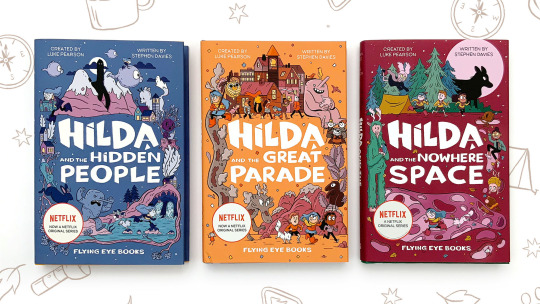
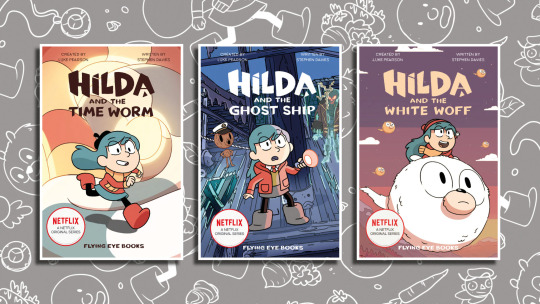
Just to recap, Hilda as a franchise has three separate canons. The series started with the Graphic Novels, written by Luke Pearson, which were then adapted into the Netflix show; Nobrow/Flying Eye Books (the publishing company behind Hilda) then released a series of chapter books written by Stephen Davies, which re-adapt the events of the show. Each one takes a few episodes and combines them into a single plotline, moving things around and changing them as necessary, and these books form their own canon.
If I had to give my thoughts in a single word, after the Season 1 tie-ins, it would have been "mean-spirited". Now, though, it's "inconsistent". I'm going to break my thoughts on them down by topic, just to make this more coherent. So, to start with:
The Art:
I'm starting with this because it's the easiest thing to talk about. In a word, the art in this series is inconsistent; the quality varies from book-to-book, and the illustrations often don't match up well with the text. It feels almost like the artists were given a brief description of the plot, rather than the final thing, to work from.
The Season 1 books are illustrated by Seaerra Miller (the artist behind Mason Mooney), and while I don't want to knock her in general, when I'd finished them I really hated her work for this series. In hindsight, though, I've softened on the art in Hilda and the Hidden People. It has a distinct style that reminds me a little of the cover art to The Wilderness Stories, and I actually think it works; my favourite piece of art in the entire tie-in series is in this book:
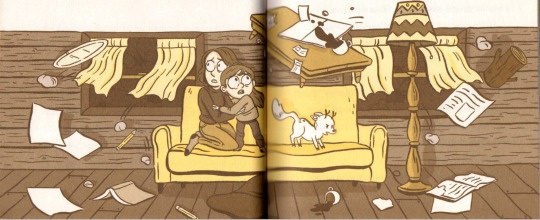
That being said, her art for The Great Parade and The Nowhere Space really suffers in comparison (part of me wonders if she was asked to stick closer to the show's style); this is where we got Trev and the Boys (my least favourite illustration in the whole series) and the infamous image of Twig:
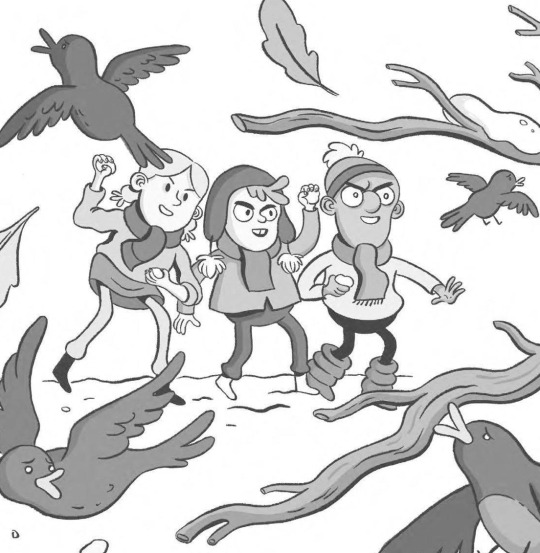
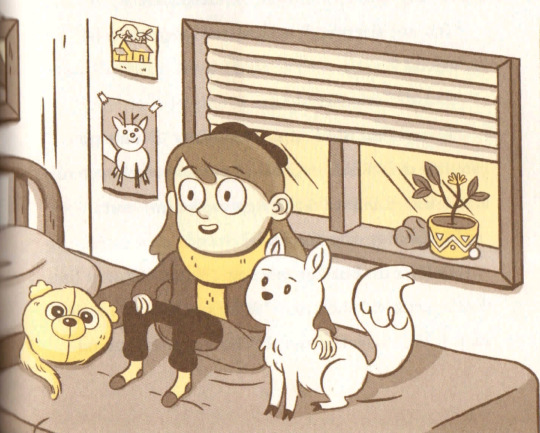
The art in these two doesn't help the general weirdness of the tie-in series; it's just not great, unfortunately, and it further suffers in the paperbacks I think. Miller's art was definitely done with the yellow colours of the hardback books in mind, while the paperbacks, which are pure greyscale, tend to look even worse. Thankfully, this is something the second set actually fixed - the art for the S2 books is done by Sapo Lendário (who are apparently a duo and not one person), and is much closer to the show, although it still suffers from inconsistency with the text (Johanna falls off a cliff at one point in the narrative but doesn't in the art) it does look quite a bit better:
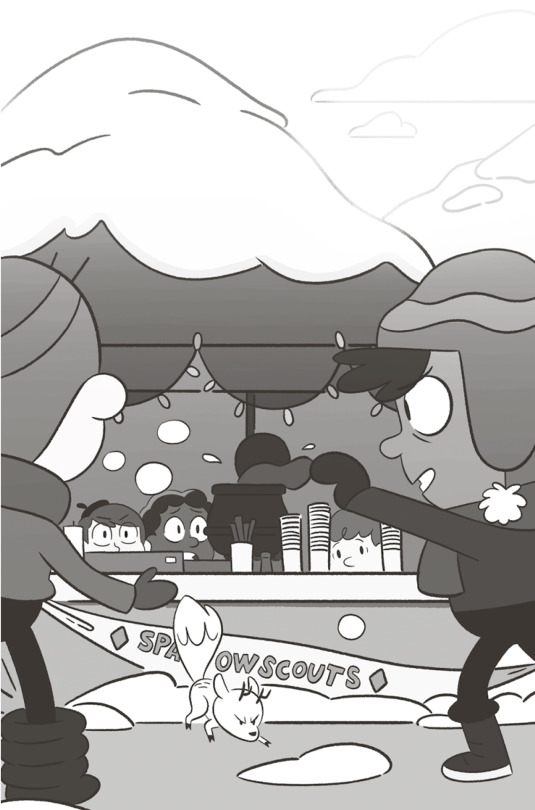
The Story
Technically the writing in the series is fine; it's a little clunky in places, and definitely meant for kids, but it's fine to read. But the tie-in series in general just feels a lot stranger than the series. There are a lot of moments that just come out of nowhere, and bits of weird writing that just jar with each other or with the show.
The biggest example for me is still the three trials Hilda has to go through to see the Elf Prime Minister in Hilda and the Hidden People; he lives in a magical 'headquarters', guarded by three magical trials of which the rabbit cavalry charge is one. This is despite the fact that he's a bureaucrat who runs a country and presumably has to get to work with his staff every morning (and needs his army for things other than just testing the courage of anyone who wants to see him).
There's moments like this throughout the series; the forest giant who keeps Hilda captive tries to rap at the Woodman, Victoria van Gale's assistant gets named Moss Head Fred, the Bellkeeper is just, weirdly verbose at all times, and Tildy and the woman who Mr Ostenfield danced with have been split into two separate characters (both still named Matilda):
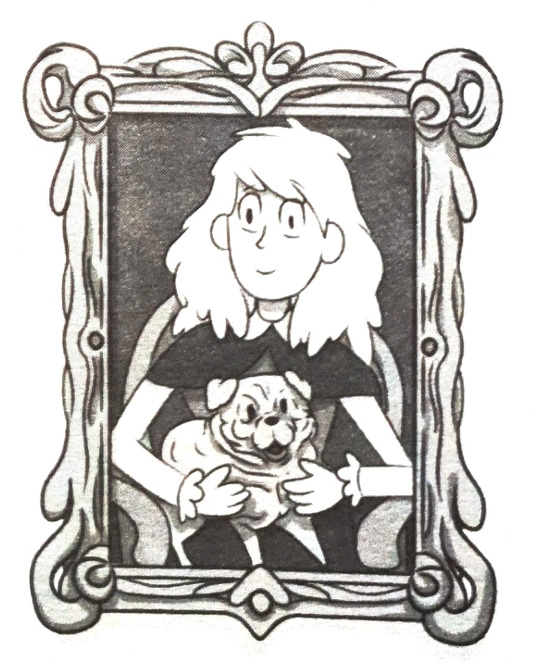
B(for reference, this is Matilda Pilqvist, while the Tildy we know is Mr Ostenfeld's partner).
The first season books are worse for this kind of stuff than the second, which do feel more Hilda; I know both are almost certainly based on early show scripts (this is normal for tie-ins like this, to make sure they're released on time, and there are a few hints like Kaisa having green hair in Hilda and the Great Parade, which is a thing in her original concept art), so it's possible the S2 scripts were more complete when Davies got them, or it's possible he was just kept on a tighter leash this time by the publishers, but there is an additional point on that that I want to come back to.
The thing is, the weird moments and inconsistencies weren't really what got to me about the first set of books; I could have stomached all of that and the janky artwork if it wasn't for just how mean-spirited the first three novels are towards Hilda. Some of this is character related, and I'll come back to that when we get to that section, but fundamentally it just felt like this series was written by someone who didn't like or understand Hilda as a character.
The whole world feels like it's against her in these novels, and it's at its worst in Hilda and the Nowhere Space and especially Hilda and the Great Parade. Trevor isn't just a kinda-mean kid, he's explicitly the class bully and tries to drown the Raven purely out of spite; David and Frida actively cut Hilda out of their lives after their first adventure (which in this timeline is The Lost Clan); and her entire class at school and every authority figure she comes across seems to just hate or want to make fun of her.
Raven Leader is a pretty big example of this, but by far the worst is Ms. Hallgrim and the entire adaptation of The Troll Rock in Great Parade. Ms. Hallgrim is introduced sending Hilda out of her class for not listening, and for making a noise while she's talking, while the entire rest of the class is openly laughing at Hilda and she is visibly hurt. Ms. Hallgrim makes no attempt to stop them from mocking her, and she doesn't get angry with them for being disruptive, but she outright shouts at Hilda.
But the moment it really crosses a line is the 'Wonderful Trolberg Exhibition', which is what the novels call the parents evening where David brings in a troll rock. Due to the reshuffled plotline, Hilda is in the middle of trying to rescue Raven (Trevor has him caged as his exhibit) when the projector gets knocked over, and like in the show Ms. Hallgrim blames her. But in this version, Hilda tries to explain that she got up free the Great Raven, and this causes the entire room including the parents, to start openly mocking her.
For her part, Ms. Hallgrim's response is to scream at Hilda about how wrong she is. She doesn't ask to speak with Hilda and her mother afterwards, or take them aside to discuss her behaviour while the mess is cleaned up; she has a legitimate reason to think Hilda knocked the projector over, but it in no way justifies her screaming at a ten-year-old child who is already visibly crying by this point because grown adults with kids of their own are jeering and laughing at her.
It's genuinely upsetting to read, and it's not the only moment like this, but the other big ones will be talked about in the characters section, because they concern Johanna.
Thankfully, the Season 2 books largely tone this down. Partially, I think it's just that Hilda has fewer conflicts with other humans and especially authority figures in Season 2, but it also comes back to how I think Stephen Davies might have been kept on a tighter leash this time; Erik Ahlberg, an authority figure who is meant to be awful and who Hilda is meant to butt up against, is pretty much his show self and thus somehow significantly more likeable than Hilda's teacher and scout leader.
This new, lighter tone is more in line with the show, but unfortunately the Season 2 books also have a new, major issue in my opinion, and that's that the pacing is just bad a lot of the time. This is kind-of present in Hilda and the Nowhere Space, which adapts the most episodes of any book in the series at six (The Sparrow Scouts, The Nightmare Spirit, The House in the Woods, The Nisse, and The Black Hound), but that mostly gets away with it just by cutting out a lot from the subplots and turning The Sparrow Scouts into a brief flashback. Hilda still has a very eventful couple of days, but it just about works for me.
The same can't be said for Hilda and the Time Worm and especially Hilda and the Ghost Ship. They have fewer episodes to adapt, at five (including a fairly clumsy flashback-explanation of The Storm) and four respectively, but The Ghost Ship especially just tries to cover far too much ground from those four episodes. The result is everything happens at a breakneck pace, and none of the plotlines have enough room to breathe.
The Witch is reduced to one scene where Hilda and Frida wander into the Witches Tower, and meet Kaisa at the door to Tildy's maze, where she hastily explains everything; they rush in and fight the Triffid (the plant), and Frida realising the sword is a key is enough for Kaisa to decide she's witch material and promise to get Tildy to train her. The entire rest of the episode, completely ignoring Kaisa's arc, is dumped later as a brief explanation to David.
And The Draugen, the episode the book is supposed to be about, gets two. Abigail just gives up after she loses the race back to shore, and the entire thing becomes a pointless detour that gets breezed through without amounting to anything. The actual load-bearing episode of the book is The Windmill, which is handled alright despite some weirdness surrounding Moss Head Fred and the nuance of Victoria's character being completely absent.
This is actually the additional factor I wanted to mention about why the Season 2 books might be less weird; according to an interview I read with Stephen Davies, the bizarre elf trials were added to Hilda and the Hidden People to fill a story that otherwise wasn't novel-length. I suspect as a result that these newer books have fewer strange moments because there was so much story already crammed-in that Davies didn't need to expand on things in his signature way.
The pacing is better in Hilda and the White Woff, which has less ground to cover and also blends things more organically (and guts The Deerfox to fit it in in a way that loses all of its emotional meaning but does actually make it fit the narrative - the flashbacks from it are now the story that scares David in The Eternal Warriors). The White Woff also does something else that I really like, more than the show even, but I'll explain that in the character section because again it relates to Johanna.
And it's not the only time this happens in the Season 2 novels; Hilda and the Time Worm suffers from the same awful pacing as The Ghost Ship, and nothing is really given the emotional weight it needs, but it also handles the plot of The Fifty Year Night in a way that doesn't stretch too far outside of the show's tone, which I think the episode does.
I've explained my issues with The Fifty Year Night before, but fundamentally it comes down to two things. I don't think Johanna's nearly as sympathetic as the show wants her to be (she's fundamentally the one at-fault in the whole Season 2 change to her and Hilda's relationship, and as much as they do show it hurts her too, in this very episode, it doesn't work as well as it should for me and it doesn't justify her mistakes), and I knew the novels were never going to fix that. But I also think the episode just goes to places that are too dark and distressing for Hilda, specifically with how the Time Worm is revealed and the deaths it causes.
And it's here that the novels are actually, genuinely better. The plotline doesn't carry the same emotional weight about the could-have-been of Ostenfeld and Tildy's relationship, and it doesn't really explain how the magazines work or that destroying them fixes things. But it does make two big changes that I like.
There are no child deaths in the book; by the time the Time Worm arrives, Hilda prime is the only Hilda still in the past (she waits and watches the dancing while the other Hildas from her previous trips - she makes one more than in the episode - go back to the present, and there is no "bad future Hilda" to sacrifice herself). And while the Worm does try and delete the various Mr Ostenfelds, they aren't alive when it does.
Changing the past causes all of the alternate versions of him, except the most recent, to just break as their timeline is erased. They just all freeze, stuck repeating the last thing they said like a skipping DVD, because they aren't real anymore; they're just shades left in time. And it's a moment that manages to be creepy and make it clear that changing the past was wrong, without forcing the reader to see Mr Ostenfeld screaming in blind terror as he's lifted up, still struggling while being devoured. It's just far less awful than the episode.
And finally, when Hilda makes it back to the present and meets the version of Mr Ostenfeld that married Tildy, Mr Ostenfeld prime is there too. He also escapes the Time Worm like Hilda does, and stays with her while his alternate self sacrifices his life.
Instead of just being cast aside for Hilda's development, he gets his own arc where he actually gets to move on from the past and accept that he missed his chance. It's a surprisingly heartfelt moment for a novel series where such things often ring hollow, and it ends with him genuinely comforting Hilda too. I would actually argue that he's closer to Hilda than the Bellkeeper is in this version.
But it doesn't make up for everything else; I wish some bits of that plot had been merged into the show's version, but I still can't call the book good, and I haven't even got into my real biggest problem with the tie-ins yet.
The Characters
Fundamentally, the characters are what ruined the first three books for me. That mean-spirited tone carried over directly to them, and I still really hate most of the novels' recurring cast as a result. But the Season 2 books did make some big changes, and it would be remiss of me not to mention them.
I will briefly mention Alfur and Tontu, but only to say neither of them really get that much depth in the novels. Tontu invites himself into Johanna and Hilda's life at the end of Hilda and the Nowhere Space, but otherwise he's pretty much the same as in the show just, a little flatter. Alfur suffers more from flanderisation, and we don't get The Replacement or anything similar, or honestly that much of a sense of his bond with Hilda, even in the S2 books. So, with them out of the way:
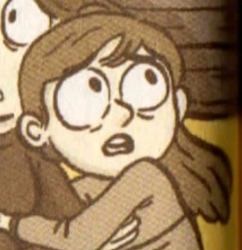
I know some people think Novel Hilda acts out more and is less nice than her show counterpart, and I have mixed opinions on that. The only time I really think that rings true is during one moment when she gets upset with Alfur in Hilda and the Hidden People; her relationship with her mum is worse, and that affects a lot, but that's absolutely on Johanna in the novels. There is also the beginning of Hilda and the White Woff, where she is a little more like her comic self in that she lies to her mum to go camping in the wilderness alone, but it's actually handled pretty well and it's something I could see Show Hilda doing, because it's to help Frida.
The biggest difference for me is actually that Novel Hilda is more emotional; she's very avoidant of confrontation, and she's brought to tears by things that would make her counterparts angry. She has a lot stacked against her, and it gets to her in ways that it doesn't in the show or the Graphic Novels.
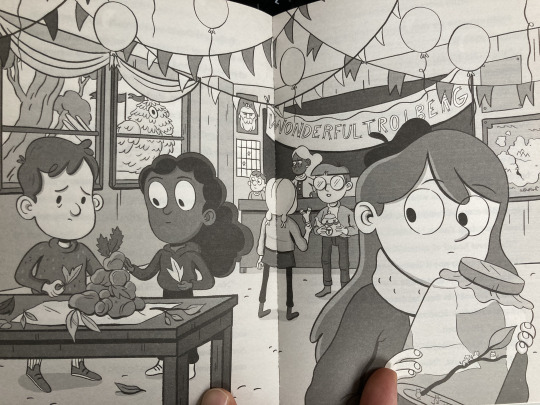
Which brings us on nicely to David and Frida. In the Season 1 novels, they are absolutely bad friends; the first adventure they share in this canon is The Hidden People, and, far from enjoying it, both Frida and David hate Hilda for dragging them into it and cut her out of their lives. The thing is, it's not wrong that Hilda convinced them to go near the wall when they didn't want to, but it doesn't really read as her being pushy or manipulative; they really don't take much convincing. And besides, she had no idea about the Bragga Clan (most of the reason Frida and David don't want to go is it's a long way away), so it all just reads as them being far too harsh on her.
There is ultimately a reconciliation, and David does apologise, but Frida never does. And this attitude continues into the next book, where David and especially Frida just get upset with Hilda for ruining their badge attempts, even when it's not her fault. David does eventually get one good moment, where he stands up to the marra giving him and Hilda nightmares, but it's offset by everything else, and by him being given Johanna's lines about how nisse can't be trusted. Since he never welcomes a nisse into his life, he never has any development about that.
Frida, meanwhile, is just consistently cold with Hilda; it feels like she wants Hilda to be her friend, but isn't really willing to be Hilda's friend in turn. Her last real moment of characterisation in the Season 1 tie-ins is her giving Hilda the cold shoulder for keeping her awake at night (to catch the marra), and that's it. Genuinely, Novel Hilda deserved better friends, which is why I'm glad to say the Season 2 novels actually fixed this.
It's not really done with any development (which is weird, because there's a way it could have been if the order of events was changed - David's standing up to the marra does give some continuity for him becoming a better friend), but Hilda and the Time Worm adapts Operation Deerfox Thunder Team straight and pretty drastically rerails the characters in the process, complete with Frida and David immediately jumping to help Hilda.
In fact, there's a moment in that book that doesn't happen in the show (and genuinely couldn't exist in the show), where Novel Johanna is talking about how Hilda is a bad daughter in her usual way, and David immediately jumps to her defence. It's a moment that I really love; it doesn't address things on any serious level, but I think it's the only time Johanna's awfulness doesn't go ignored and it's very much David at his full show self.
Frida is also better in this book; I was worried at the start of Hilda and the Ghost Ship that that hadn't stuck, because she is pretty mean to David behind his back at the beginning in a way that reminded me a lot of how she was with Hilda in the first season novels. But since this novel adapts The Windmill, it is sort-of addressed. Hilda is the one that apologises at the end, but she does earnestly apologise for both of them, so I'm iffy on it but it's not the worst thing.
It's also helped by The Eternal Warriors happening at the start of Hilda and the White Woff, immediately afterwards; the whole thing is again a bit brief, but the reassurance from both Hilda and Frida that they like David the way he is does get given, so all in all it's fine. By the end of the Season 2 books I like David a lot, even if I feel like his growth could've been handled better, and I think Frida's okay.
And that just leaves one more major character, the one I know a lot of people will have been waiting for me to discuss:
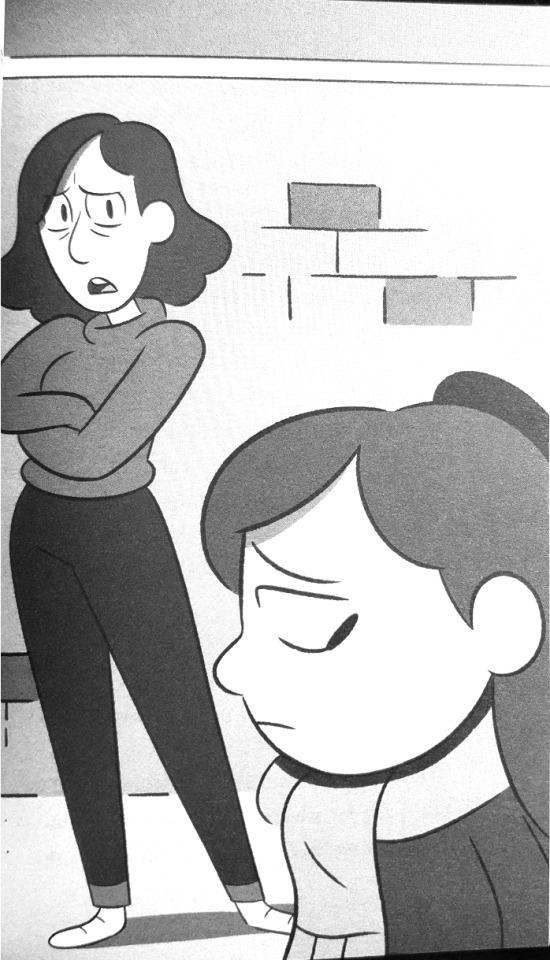
(I both love and hate this image because it just perfectly sums up their relationship in the majority of the novels)
Novel Johanna is still my least favourite character in the whole franchise; more than Show Erik, or the Committee of Three, or Trylla, or the Time Worm, I genuinely hate her. But there is a "but" there now, because the Season 2 books did something I never expected them to do.
I've said before that I don't think Stephen Davies went into this to write Johanna as an awful person; I think the intention is that she's the struggling mother of an often-difficult child. But that just isn't what's portrayed; in every book except Hilda and the White Woff, Novel Johanna is genuinely emotionally abusive.
The first time I read Hilda and the Hidden People, the one thing that stuck with me more than anything else was how Johanna handles the move. I went into the book aware that Johanna was a worse parent in the novels; I'd seen bits of Hilda and the Nowhere Space, and we will come back to that, but that first book got to me in a way I wasn't quite expecting.
Because the only word I have for the way Novel Johanna handles it is insidious. Hilda accuses her of wanting to move, of just using the elves as an excuse for existing plans, and the way it's handled makes me think that she's right. Novel Johanna is committed to it from the start, and instead of being honest with Hilda, she lies to her daughter's face about it.
When they first visit the city, Johanna tells Hilda it's just to look around, in a way that's blatantly a lie; she actually wants to choose their new home and get Hilda ready for school and everything. It's not like in the show, where she's transparent about what she's considering and doesn't commit to anything for Hilda's sake. And when Hilda calls her out on this, and is understandably upset as a young child having her life ripped out from under her, her mum doesn't try and comfort her or get her to see that the city isn't so bad. Show Johanna deeply understands that the move is going to hurt Hilda; Novel Johanna makes it about herself.
And that's the lynchpin that pushes Johanna into abusive in these novels for me. She has a daughter who she didn't talk to about this (the first time it comes up, she immediately shuts down any discussion), who is upset because she might be about to lose everything she's ever known, and all she says is "please don't be difficult". It genuinely reads as manipulative and it's awful, and what gets me is Hilda ultimately accepts it.
In the moment when she falls off Illus (Jorgen's partner), she's momentarily sure she's going to die, and all she can think about is how bad of a daughter, how mean she's been to her mum, when really Johanna is the one who hurt her. There's even a moment in Trolberg that I'd forgotten until I reread this for this, where Hilda's reaction to the bells of the city genuinely seems uncomfortably close to a sensory overload, and Johanna doesn't even notice (it's right before more of her being determined to move).
And Johanna not caring is the theme in Hilda and the Great Parade. She doesn't even try and help Hilda adjust (there's one fond moment where Hilda complains over-dramatically about the city and her mum just hugs her and goes "oh you poor thing" sarcastically - it's a genuinely fond moment, but as the only moment where this is addressed, it rankled me), but the real problems emerge once Hilda gets rejected by David and Frida.
Novel Johanna hugs her when she cries about that, and about how much she hates the city and everything, but all she says to comfort her is that Frida and David's exhibit for the Wonderful Trolberg Exhibition probably sucks; it's not abuse here, but it's just not enough to make up for everything so far.
And then it comes out that Johanna put the Raven out; in this version, she's tricked into giving him to Trevor, who then tries to use him as his exhibit. And obviously Johanna didn't know that the raven was the Great Raven, or that Trevor is a bully, but she just doesn't care even after she finds out those things. In the show, Johanna apologises for putting the Raven out and does everything to help Hilda get him back, even though it's not fully her fault, but in the books she just sits there; there's even a moment where Hilda actually is upset with her for this, and the implicit message of the narrative in that moment is that Hilda is the one being unfair.
This leads straight into that scene I mentioned already from The Troll Rock. Johanna could have prevented it in the first place, just by telling Ms. Hallgrim that Trevor stole the Raven from her, but she doesn't; and when Hilda tries to get him back herself, and the projector is destroyed and the entire room of adults starts mocking Hilda, Johanna just glares at her, and then asks if she's feeling sick because of how she's acting. She's completely okay with her child being screamed at to the point of tears (and in the 3rd book, we see why), she has no moment of talking to Hilda's teacher, and the most Hilda is able to get her to do is to pass a note to Frida, which she does reluctantly.
She does get a bonding moment with Hilda on the wall at the end, overlooking the parade, but it's not earned and with the bad taste everything else leaves in my mouth it is unfortunately easy to read in a negative light too. Because there's still no moment of Johanna being sorry that they had to move or accepting that Hilda misses the wilderness, but there is a moment where Johanna hugs her close, after Hilda finally admits the city is nice. On its own, it would be a fine little moment, and even in the worst interpretation I don't think Johanna could be seen as malicious here, but with what we've seen of her it just gets to me that they don't get the bonding moment until Hilda caves.
And then comes Hilda and the Nowhere Space, and it all gets so much worse again. Because in this version, the reason Hilda even joined the Sparrow Scouts is because Johanna "loved the idea of Hilda following in her footsteps." Not because she thought it was good for Hilda, but because she wanted Hilda to be like her, and it's clear in this novel that Hilda doesn't actually enjoy it; she struggles with organised activity and Raven Leader doesn't like her, but she doesn't have a choice.
And all Johanna asks her is about badges; never about how fun it was, or how she's feeling, just if she's gotten any badges yet. The pressure she puts on her daughter is far worse than in the show, and feels uncomfortably deliberate, all while Hilda ends up tying her own sense of self-worth to scouting badges.
And when it all comes out, when Hilda sits there at the badge ceremony and gets nothing, Johanna comes and sits next to her, and berates her to the point of tears. It's another genuinely, deeply upsetting moment, and again the whole thing from start to finish reads as emotional abuse. Johanna does love Hilda, I don't doubt that, but she wants a Hilda who's just like her, and isn't willing to accept her daughter is her own person.
She does apologise for this, but it's just not good enough; because it's not an apology. It's "please forgive me. I was horrible to you" - it puts the onus on Hilda to forgive, not on her mum, and it doesn't even mention the months of pressure that came before. Show Johanna apologised just because her excitement made Hilda feel bad, but Novel Johanna doesn't care.
So I wasn't looking forwards to seeing how the novels handled The Fifty Year Night, where I think Johanna is already unreasonably harsh and not listening when she should be. And, unfortunately, I was right to be worried; in this version of the plotline, Johanna actually has more legitimate reason to be upset (she grounds Hilda for the sabotage from The Old Bells, which is an actual crime, even if it was justified). But the phrasing she uses is just as awful and manipulative as it was in Hilda and the Hidden People. Specifically, she accuses Hilda of lying specifically, knowingly to hurt her mum.
The reconciliation for this really doesn't work, either, because there kind-of isn't one; The Fifty Year Night leads straight into The Yule Lads, and the next time Hilda and her mum interact is Sonstansil (the gift-giving happens in the flat because Hilda is still grounded), and the whole book ends with Hilda being grounded for two more weeks.
In Hilda and the Ghost Ship, Johanna barely appears, but her only real moment isn't a great one. The climaxes of The Beast of Cauldron Island and The Windmill happen on the same day, and Hilda and Frida stop by Hilda's flat on their way to the windmill to save David, so that they can grab Tontu; Hilda lies to her mum to get away, but before she does, Johanna says that if she behaved like Hilda (specifically, explicitly, running off on adventures), her parents would have done something else.
She gets cut off at "would have", which suggests to me that it's more than just grounding her or being harsh; I genuinely think the implication is that Johanna's parents were abusive towards her. And I think that's already loosely implied in all canons, that she's at least somehow estranged from them, but it is a sad detail to me that if it is what the creators want to imply, then the thing that separates Novel Johanna from her counterparts is that she fell into the same pattern of abuse that her parents taught her.
And that's the thing; this whole thing is a pattern, where Johanna so often wants a perfect little copy of her and is willing to resort to genuine abuse to try and keep Hilda in that box. She loves her daughter, I don't deny that, but that's the thing; abusers do care about their victims.
I know it's not what Stephen Davies or Nobrow/Flying Eye Books intended, and it does rely on reading some neutral moments (like the end of the Great Parade) in a very negative light, but when there's so many moments that are just legitimately awful, and almost completely unaddressed, I can't escape the conclusion. Novel Johanna is an abusive parent, and it's genuinely upsetting.
But there is that one "but" I mentioned, and that's the final book so far, Hilda and the White Woff. I genuinely don't know what happened here, but somehow it went the exact opposite way to the rest of the series. I was fully expecting the argument at the start of The Stone Forest to be so much more awful in a canon where Johanna is consistently harsh and likes to guilt-trip her own child, but that's not what we get.
I'm not going to go into too much detail here, because I think I've mentioned it enough times already, but I don't like the way Season 2 of the show handles Hilda and Johanna's relationship. And fundamentally, that's because it's Johanna's fault that Hilda stops telling her things. Hilda doesn't like hiding things, but she feels like she has to, because her mum has started getting upset with her adventures. She's become overprotective, and lost her daughter's trust, but the show wants her to be the one in the right anway.
So I'm really not a fan of how The Stone Forest goes in the show; I don't think it adapted well from the comics (where Johanna is consistently not great but not abusive), I don't like the parallels it tries to draw, and I don't think the reconciliation at the end was good enough because Johanna makes no apologies (besides for losing the guide, which is a great moment on its own but doesn't resolve things) or promises to be different herself. It's all on Hilda.
So I was very pleasantly surprised when the novels somehow fixed a lot of my problems with this arc. Because Novel Johanna in Hilda and the White Woff isn't the same as the Novel Johanna we've seen so far; the argument that kicks things off is worse (it's about on the level with the argument from the end of Cauldron Island) but here Johanna feels more justified because Hilda went camping out in the wilderness overnight without telling her (this actually leads to The Eternal Warriors in this version).
Now, that feels a little far for Hilda normally (outside of the comics), but I could see her doing it to help a friend (in this case, Frida) so I don't begrudge it. It also makes it feel less like Hilda's hiding what she normally does because she now has to, and more like a moment where she genuinely goes too far. It also does help that this series didn't start off with the relationship between Hilda and Johanna amazing, and then awkwardly retcon it to be worse; in the grand scheme of things, Johanna's actions in this book absolutely do not make up for how awful she is in the rest of them, but the inconsistency makes it feel less like the unsatisfying ending to a season-long plotline and more like its own isolated thing where the conflict starts and ends within this book. And in that way, it's nice to have a book where Johanna is actually a good parent.
And then the ending comes, and we get the conversation in Hilda's bedroom. And it's genuinely what I wish this interaction had been in the show; there isn't too much added, but Johanna does more than just say she doesn't wish Hilda was different, she also explicitly tells her she doesn't need to be better, and that she's not bad; she's proud of her daughter for being the way she is. If this had been the way the Hilda and Johanna falling-out arc ended in canon, I still wouldn't have been a massive fan (because of how it starts) but I might not have been so desperate to fix it myself.
Above all else, that just leaves me reeling; my only guess is that the major mother/daugher interactions in this book are lifted directly from earlier scripts (because they do contain a lot of the final lines too), because somehow, in the last tie-in, Johanna feels more like herself than she felt in half of Season 2. And I'm sorry, because it does feel bad to knock him, but I really doubt that's Stephen Davies' doing.
Either way, that leaves me with a weird conclusion, which is if you're going to read any of the novels, read Hilda and the White Woff and then ignore all the others; it's better standing alone. It does miss some of the strongest emotional beats that the show puts in The Stone Forest and The Eternal Warriors, but it makes up for it in my eyes by making the emotional moments it does keep genuinely better. I don't think any of the others are worth reading, and overall I still hate Novel Johanna as she's normally written, but somehow, out of all of that awfulness, there was one good thing that came of it
And of course, this is all my opinion, so please don't feel bad if you feel differently.
#hilda the series#hilda netflix#hilda novels#hilda n1#hilda and the hidden people#hilda n2#hilda and the great parade#hilda n3#hilda and the nowhere space#hilda n4#hilda and the time worm#hilda n5#hilda and the ghost ship#hilda n6#hilda and the white woff#hilda (hilda)#david hilda#frida hilda#johanna hilda#twig hilda#bad mum trauma hours#pikas detailed thoughts#negative#child abuse tw#remked-r3sponds#hilda n7
91 notes
·
View notes
Note
What is you favorite adapation of Hilda and were there any changes between the mediums that you liked or that you didn't liked?
Well, that's a hard one to answer. I like all of them!
I just treat the comics/series/novels as an entirely different storyline from each other.
I like the carefree attitude of Hilda in the series, her bratty? behavior in the comics, and I like the more "real" approach in the novels, especially the second one, Hilda and The Great Parade (N2) although it starts to become confusing in the S2 novels tho and I might do a re-read soon. All of them are cosy too.
There are slight to major differences between the 3 mediums, but that would be spoiler-y.
16 notes
·
View notes
Note
what did you think about the Hilda Activity book?
The first Activity book (Hilda's Sparrow Scout Badge Guide) is a small addition to Trolberg lore but not much. This book was meant for aspiring scouts.
If you want more info, the second one (Hilda's book of Beasts and Spirits) contains a lot! Some are not obvious at first look but it's worth buying for those watercolor paintings alone!
4 notes
·
View notes
Note
Headcanons on what might happen if, instead of living with her mom, Hilda was adopted and raised by Erik Ahlberg?
Well, She would be a person with a strong sense of justice to all.
Or was it a complete opposite (a brat, selfish, full of herself etc.)
3 notes
·
View notes
Note
Favourite moment from the novels?
...I can't say for sure tbh, as the events are near-identical to the series.
I guess that would be the time Hilda learned to ride a bike (in detail)
P.S.: It just so happens that I also learned to ride a bike at these times. I even got one in "royal blue", which is the same color as Hilda's. It's never too late, right?
7 notes
·
View notes
Note
Do you think the novels used earlier drafts and material of the TV series when doing the adaptations? Still haven't read them yet but I gotten "Hilda and the Troll" and Hilda doesn't seem to like Woodman at first. And according to the wiki, Hilda was annoyed of him entering the house instead of Mum unlike the the show. And of course there was that bit with Kaisa having green highlights like in some concept art for her.
Definitely!
I mean, Hilda has the same reaction to woodman in the comic and the novel (as you mentioned), and the librarian having green-tipped hair in the novel as well as the early drafts of the series (as you also mentioned), but it seemingly changed to purple in N5, but this can also mean a different librarian is portrayed in N2? idk, she wasn't described that much.
It's natural to assume that Stephen Davies (the author for the Novel Series) have access to these early drafts, so I'm not surprised.
10 notes
·
View notes
Note
Honest question about book 6, is the White Woff actually part of the story?
Of course, it’s in the title!
(although, still in an ex-machina fashion tho)
7 notes
·
View notes
Note
Do you accept headcanon asks?
Sure! (no guarantees, however)
1 note
·
View note
Note
i'm gonna unfollow you for a bit while i get caught up but im bookmarking your tumblr, ill be back
oh cool, have fun!
3 notes
·
View notes
Text
I noticed a lot of new followers lately. S2 is rising!

Most people would say thanks, but I'm gonna be honest with you all:
I'm not exactly an artist here, but I do reblog art, make some shitpost memes from time to time, and that's about it (about to venture into other stuff as well).
You can ask me anything about Hildafolk (just not the S2 novels, which I still don't have atm), or anything else (or just to say hi!)
Note: I may not be active in the following weeks, but I'll try my best to answer.
3 notes
·
View notes
Text
You're absolutely correct! I just wanted to show what power supplies looked like back then and what it is now. The difference in energy density is unbelievable!
Most modern consumer devices can tolerate such voltage ripples from switching power supplies. Also, the only groups that I can think of who wants pure, no-noise power source are scientists and audiophiles.
I can't complain about reliability, as the old power supply is STILL working. Old tech is just built different!
Both are 60+ watt power supplies.
33 years apart.

56 notes
·
View notes